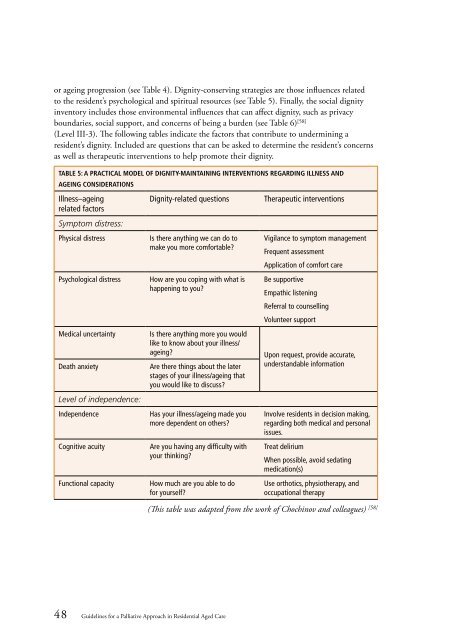Guidelines for a Palliative Approach in Residential Aged Care
Guidelines for a Palliative Approach in Residential Aged Care
Guidelines for a Palliative Approach in Residential Aged Care
You also want an ePaper? Increase the reach of your titles
YUMPU automatically turns print PDFs into web optimized ePapers that Google loves.
or age<strong>in</strong>g progression (see Table 4). Dignity-conserv<strong>in</strong>g strategies are those <strong>in</strong>fluences related<br />
to the resident’s psychological and spiritual resources (see Table 5). F<strong>in</strong>ally, the social dignity<br />
<strong>in</strong>ventory <strong>in</strong>cludes those environmental <strong>in</strong>fluences that can affect dignity, such as privacy<br />
boundaries, social support, and concerns of be<strong>in</strong>g a burden (see Table 6) [58]<br />
(Level III-3). The follow<strong>in</strong>g tables <strong>in</strong>dicate the factors that contribute to underm<strong>in</strong><strong>in</strong>g a<br />
resident’s dignity. Included are questions that can be asked to determ<strong>in</strong>e the resident’s concerns<br />
as well as therapeutic <strong>in</strong>terventions to help promote their dignity.<br />
Table 5: A practical model of dignity-ma<strong>in</strong>ta<strong>in</strong><strong>in</strong>g <strong>in</strong>terventions regard<strong>in</strong>g illness and<br />
age<strong>in</strong>g considerations<br />
Illness–age<strong>in</strong>g<br />
related factors<br />
Symptom distress:<br />
Physical distress<br />
Psychological distress<br />
Medical uncerta<strong>in</strong>ty<br />
Death anxiety<br />
Level of <strong>in</strong>dependence:<br />
Independence<br />
Cognitive acuity<br />
Functional capacity<br />
Dignity-related questions<br />
Is there anyth<strong>in</strong>g we can do to<br />
make you more com<strong>for</strong>table?<br />
How are you cop<strong>in</strong>g with what is<br />
happen<strong>in</strong>g to you?<br />
Is there anyth<strong>in</strong>g more you would<br />
like to know about your illness/<br />
age<strong>in</strong>g?<br />
Are there th<strong>in</strong>gs about the later<br />
stages of your illness/age<strong>in</strong>g that<br />
you would like to discuss?<br />
Has your illness/age<strong>in</strong>g made you<br />
more dependent on others?<br />
Are you hav<strong>in</strong>g any difficulty with<br />
your th<strong>in</strong>k<strong>in</strong>g?<br />
How much are you able to do<br />
<strong>for</strong> yourself?<br />
Therapeutic <strong>in</strong>terventions<br />
Vigilance to symptom management<br />
Frequent assessment<br />
Application of com<strong>for</strong>t care<br />
Be supportive<br />
Empathic listen<strong>in</strong>g<br />
Referral to counsell<strong>in</strong>g<br />
Volunteer support<br />
Upon request, provide accurate,<br />
understandable <strong>in</strong><strong>for</strong>mation<br />
Involve residents <strong>in</strong> decision mak<strong>in</strong>g,<br />
regard<strong>in</strong>g both medical and personal<br />
issues.<br />
Treat delirium<br />
When possible, avoid sedat<strong>in</strong>g<br />
medication(s)<br />
Use orthotics, physiotherapy, and<br />
occupational therapy<br />
(This table was adapted from the work of Choch<strong>in</strong>ov and colleagues) [58]<br />
48 <strong>Guidel<strong>in</strong>es</strong> <strong>for</strong> a <strong>Palliative</strong> <strong>Approach</strong> <strong>in</strong> <strong>Residential</strong> <strong>Aged</strong> <strong>Care</strong>
















